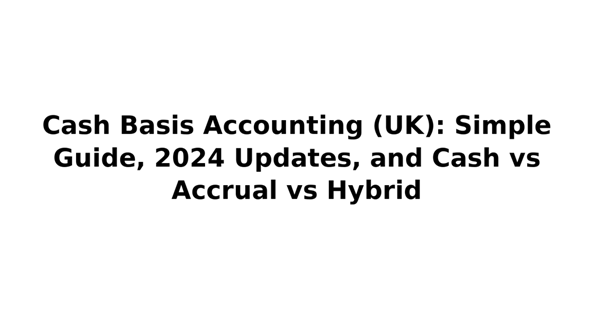-
News
-
Blog
-
Archive

If your books only make sense once a year, you're running your business in the rear-view mirror. Cash basis accounting can simplify day-to-day decisions especially after the 2024 reforms while accrual accounting still wins for growing firms that trade on credit. Here's how to choose, with plain-English examples.
What Is Cash Basis Accounting?
Cash basis accounting records income when you're paid and expenses when you pay. It broadly mirrors cash in your bank. From April 2024, it's the default method for most unincorporated businesses (sole traders and partnerships that aren't LLPs). Companies still use accrual accounting.
Need tailored advice on which method fits your goals and taxes? See our Taxation page or run scenarios with our Online Calculator.
Benefits of Cash Basis Accounting
- Simplicity: Fewer timing adjustments; easy to reconcile to your bank.
- Cash clarity: Profit tracks cash more closely, helping with affordability and tax budgeting.
- Admin light: Often quicker to produce monthly figures; helpful for micro businesses and side hustles.
- Tax timing: You don't pay income tax on invoices that are still unpaid at year end.
What Are the Downsides of Cash Basis Accounting?
- Less accurate for credit trading: If you invoice customers on terms or hold supplier credit, cash timing can hide issues (e.g., growing debtors).
- Performance analysis: Matching sales to costs is harder; margins and KPIs can be distorted.
- External stakeholders: Banks, investors, grant bodies, or tenders typically prefer accrual accounts.
- Specific rules still apply: Some items (e.g., cars) may still use capital allowances; you'll need consistent treatment.
Examples of Cash Basis Accounting
- Freelance designer (mostly card payments):
- Invoice paid on 10 March ? income in March.
- Software subscription paid monthly ? expense each month.
- Simple, cash mirrors bank.
- Plumber (deposits then balance on completion):
- 40% deposit received in April ? income in April.
- Materials paid in April ? expense in April.
- Balance paid in May ? income in May.
- Profit follows cash steps.
- Café (stock + supplier credit):
- Buys stock on 30-day terms; sales are cash.
- Cash basis may overstate profit in the month stock is sold (because purchase cash leaves next month).
- Accrual gives a truer margin here.
Changes to Cash Basis Accounting in 2024 (What's New)
From 6 April 2024 (2024/25 tax year):
- Default method: Cash basis is now the default for most sole traders and simple partnerships (you can opt out to accrual).
- Turnover limit removed: Prior entry/exit thresholds scrapped more businesses can use cash basis.
- Finance cost cap removed: Previous £500 cap on interest deductions removed for cash basis users.
- Loss relief rules relaxed: Loss treatment under cash basis brought closer to accrual rules.
How to Use Cash Basis Day to Day
- Bank-first bookkeeping: Reconcile from bank feed ? tag customer receipts and supplier payments.
- Separate personal & business: Use a dedicated business account; avoid mixed spending.
- Track debtors/creditors off-ledger: Even on cash basis, keep a simple list of unpaid invoices and bills for cash planning.
- Capex consistency: Record capital items per the cash-basis rules; cars often still go through capital allowances.
- VAT note: Cash basis accounting is not the same as the VAT Cash Accounting Scheme. You can mix methods (e.g., accrual accounts with VAT cash accounting) depending on eligibility ask if it's right for you.
What Is Accrual or “Traditional” Accounting?
Accrual accounting recognises income when earned (invoice/date of supply) and expenses when incurred (goods/services received), regardless of when cash moves. It matches revenues and costs to the correct period.
Benefits of Accrual Accounting
- True performance: Clear margins and KPIs; better for pricing and growth decisions.
- Works with stock & credit: Reflects inventory, work-in-progress, and staged invoices accurately.
- Stakeholder-ready: Banks and investors expect accrual accounts; supports funding applications and tenders.
- Comparability: Month-to-month numbers are more meaningful for trend analysis.
Downsides to Accrual Accounting
- More complex: Requires journals for prepayments, accruals, WIP, and depreciation.
- Time & cost: More bookkeeping work; year-end can take longer.
- Tax timing: You may pay tax on income before the cash lands (if customers pay slowly).
Which Accounting Method Is Best? Cash vs Accrual vs Hybrid
- Choose Cash Basis if: you're a service-led sole trader/partnership with few invoices on credit, minimal stock, and you prioritise admin simplicity and cash clarity.
- Choose Accrual if: you hold stock, offer credit terms, scale rapidly, seek finance, or need precise margins and KPIs.
- Hybrid in practice: Some businesses keep management accounts on accrual for decision-making, but file cash basis for tax timing. Others run accrual statutory accounts but opt into VAT Cash Accounting for cash flow. The right blend depends on scale, funding, and sector.
Cash Basis Accounting FAQs
Is cash basis allowed for limited companies?
No limited companies use accrual accounting. Cash basis is mainly for sole traders and ordinary partnerships.
Can I switch between cash and accrual?
Yes, but consistency matters. Switching affects opening/closing adjustments; get advice first to avoid double-counting or missed costs.
Is cash basis the same as VAT Cash Accounting?
No different rules. You can use one without the other if eligible.
Do I still claim capital allowances on cash basis?
Often you deduct most capital purchases when paid under cash basis rules; cars generally still use capital allowances. Check your facts before year-end.
Where can I read official guidance?
Conclusion
With the 2024 reforms, cash basis accounting became simpler and more widely available great for many sole traders and partnerships who want low friction bookkeeping and tighter control over cash. But if you carry stock, trade on credit, or aim for funding, accrual accounting (or a hybrid approach) will tell a truer story and support growth.